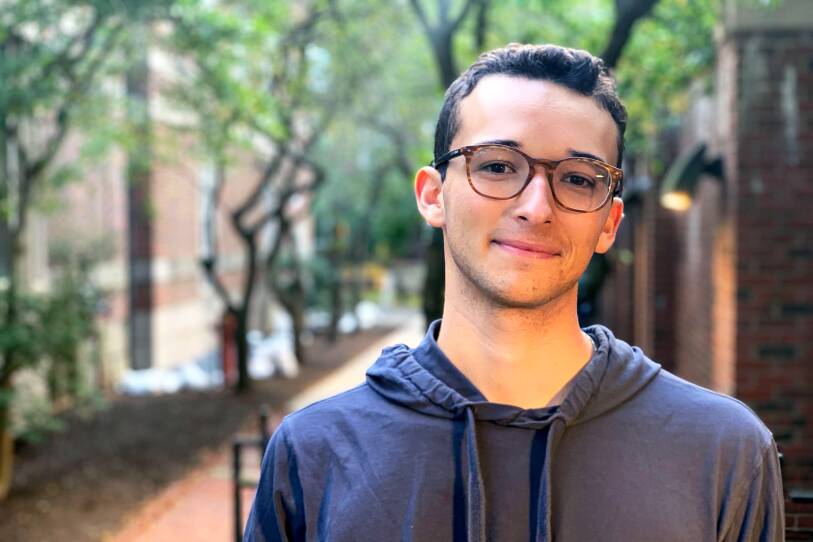It's become known as the “doxxing truck”: a vehicle with oversized LED screens flashing images and names of Harvard students who criticized Israel in the days following the attack by Hamas militants.
The truck labeled the students — who had signed a letter holding the Israeli government responsible for Hamas’ violence — as “Harvard’s Leading Antisemites.”
The incident roiled Harvard and highlighted the extreme unrest on U.S. college campuses since the conflict between Israel and Hamas erupted less than two weeks ago. Universities that pride themselves as bastions of intellectual freedom and hubs of social activism, whether the Black Lives Matter movement or the war in Ukraine, are now confronting higher-stakes strife on campus as students receive death threats and wealthy donors depart.
On Monday, the Wexner Foundation, built on the Victoria’s Secret and Bath & Body Works fortune, ended its philanthropic relationship with Harvard’s Kennedy School of Government, dismayed that Harvard did not unequivocally condemn Hamas’ deadly attack on Israel. Earlier this week, Israeli businessman Idan Ofer and his wife Batia Ofer also stepped down from the Kennedy School’s board in protest.
Pro-Palestinian and pro-Israeli student groups are holding vigils, protests and counterprotests from the University of Washington in Seattle to Columbia University in New York, where administrators closed the Upper West Side campus to the public amid dueling protests due to safety concerns.
At Stanford, administrators are investigating a lecturer accused of blaming the Israel-Hamas war on Zionists and then separated Jewish students from their belongings to simulate what Jews were doing to Palestinians.
Free speech advocates, though, argue that universities should not feel obligated to respond or take sides — even if funding is at stake.
“I condemn terrorism myself, but the problem is universities should not do that because universities have to be an environment in which students, faculty and others feel free to express their views,” said Geoffrey Stone, a law professor at the University of Chicago. “Students and faculty should have the right to say, ‘Well, terrorism is justified in certain circumstances.’”
Stone helped develop what became known as the “Chicago Principles” in 2014, after student protests led colleges to withdraw invitations to controversial speakers. The Chicago Principles are an “overarching commitment to free, robust, and uninhibited debate.” Since then, more than 70 colleges and universities across the country have adopted them, including Princeton, Purdue, Georgetown and Virginia Tech, according to the Foundation for Individual Rights and Expression.
Stone said he never intended for them to be adopted so widely.
But not all colleges are on board. Critics of the principles have said they offer limited value because they do little to foster mutual understanding or create an atmosphere of learning.
Harvard has not adopted the “Chicago Principles” and declined to comment for this story.
But in the wake of the doxxing truck, Harvard President Claudine Gay condemned the stunt in a video released Thursday evening.
“We have a choice. We can fan the flames of division and hatred that are roiling the world, or we can try to be a force for something different and better,” she said.
Gay also condemned terrorism and reinforced the university’s commitment to free speech.
“That commitment extends even to views that many of us find objectionable, even outrageous,” she said.

Pro-Israel students voiced concerns about a lack of moral clarity in the United States around the violence in the Middle East.
“When Russia invaded Ukraine, there was a Ukrainian flag in the Yard, there was no wavering,” first-year student Charlie Covit, a member of Harvard Hillel, said at a recent Shabbat event on campus. “There was total moral clarity. And not seeing that here when it’s Jews that are being killed is, I think, disappointing.”
Some pro-Palestinian students told GBH News anonymously that they feared for their safety. They said they have faced harassment and even death threats.
“It has been very scary and it has been very horrific to see that Harvard has left Palestinians and pro-Palestinian voices on its campus to fend for themselves,” one woman said.
Some pro-Palestinian student groups that initially signed a statement blaming Israel for the Hamas attacks have since apologized and retracted their signatures. But the issues surrounding the conflict are far from resolved.
Protests are planned across the country throughout the week.
GBH’s Esteban Bustillos contributed to this story.








